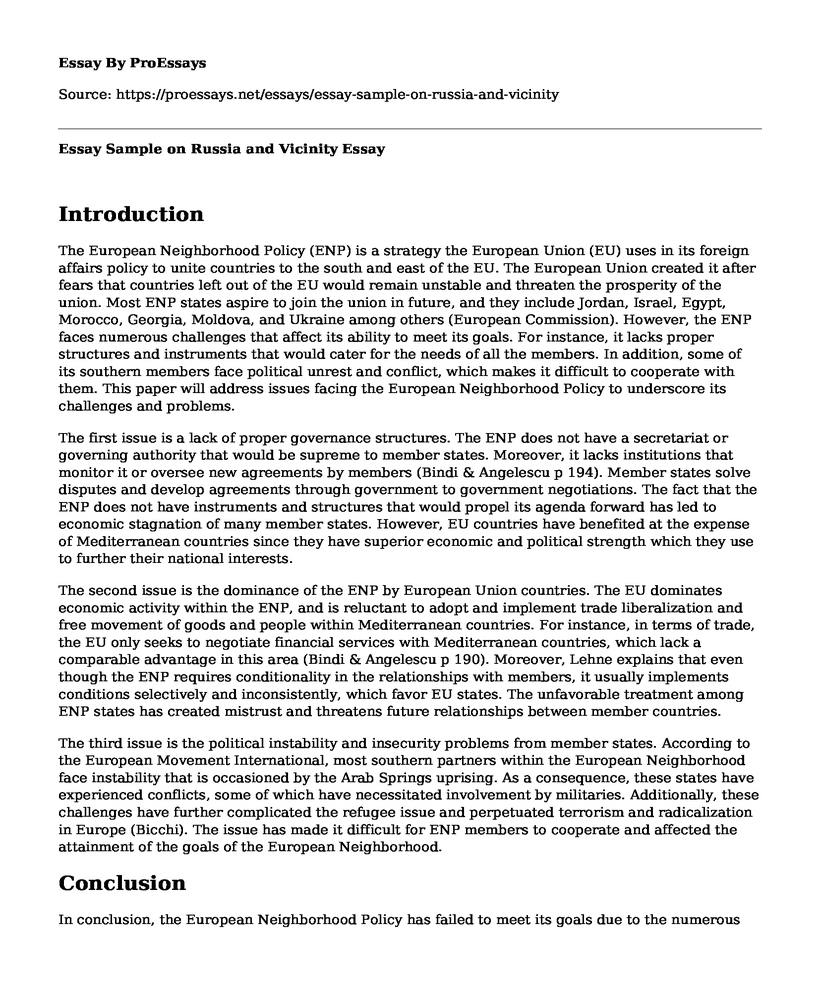Introduction
The European Neighborhood Policy (ENP) is a strategy the European Union (EU) uses in its foreign affairs policy to unite countries to the south and east of the EU. The European Union created it after fears that countries left out of the EU would remain unstable and threaten the prosperity of the union. Most ENP states aspire to join the union in future, and they include Jordan, Israel, Egypt, Morocco, Georgia, Moldova, and Ukraine among others (European Commission). However, the ENP faces numerous challenges that affect its ability to meet its goals. For instance, it lacks proper structures and instruments that would cater for the needs of all the members. In addition, some of its southern members face political unrest and conflict, which makes it difficult to cooperate with them. This paper will address issues facing the European Neighborhood Policy to underscore its challenges and problems.
The first issue is a lack of proper governance structures. The ENP does not have a secretariat or governing authority that would be supreme to member states. Moreover, it lacks institutions that monitor it or oversee new agreements by members (Bindi & Angelescu p 194). Member states solve disputes and develop agreements through government to government negotiations. The fact that the ENP does not have instruments and structures that would propel its agenda forward has led to economic stagnation of many member states. However, EU countries have benefited at the expense of Mediterranean countries since they have superior economic and political strength which they use to further their national interests.
The second issue is the dominance of the ENP by European Union countries. The EU dominates economic activity within the ENP, and is reluctant to adopt and implement trade liberalization and free movement of goods and people within Mediterranean countries. For instance, in terms of trade, the EU only seeks to negotiate financial services with Mediterranean countries, which lack a comparable advantage in this area (Bindi & Angelescu p 190). Moreover, Lehne explains that even though the ENP requires conditionality in the relationships with members, it usually implements conditions selectively and inconsistently, which favor EU states. The unfavorable treatment among ENP states has created mistrust and threatens future relationships between member countries.
The third issue is the political instability and insecurity problems from member states. According to the European Movement International, most southern partners within the European Neighborhood face instability that is occasioned by the Arab Springs uprising. As a consequence, these states have experienced conflicts, some of which have necessitated involvement by militaries. Additionally, these challenges have further complicated the refugee issue and perpetuated terrorism and radicalization in Europe (Bicchi). The issue has made it difficult for ENP members to cooperate and affected the attainment of the goals of the European Neighborhood.
Conclusion
In conclusion, the European Neighborhood Policy has failed to meet its goals due to the numerous challenges it faces. Some of them include a lack of governance structures, domination by EU countries, and political instability and insecurity by many southern European states. Currently, many members of the ENP are more isolated from the EU than they were before they embraced the policy. They continue to face political unrest and their economic growth has slowed down. It is imperative that the ENP addresses these challenges so that members feel that they are equal, and they all benefit from economic prosperity, which is the main goal of the European Neighborhood.
Works Cited
Bicchi Federica. Lost in transition:' EU Foreign Policy and the European Neighbourhood Policy Post-Arab Spring. Retrieved from https://www.cairn.info/revue-l-europe-en-formation-2014-1-page-26.htm#, 2014
Bindi Federiga & Angelescu Irina. The Foreign Policy of the European Union: Assessing Europe's Role in the World (Second Edition). Brookings Institution Press, 2012
European Commission. European Neighbourhood Policy. Retrieved from https://ec.europa.eu/neighbourhood-enlargement/neighbourhood/overview_en,2018
European Movement International. The EU and the Southern Neighbourhood: more than crisis-management. Retrieved from https://europeanmovement.eu/the-eu-and-the-southern-neighbourhood-more-than-crisis-management/, 2018
Lehne Stefan. Time to Reset the European Neighborhood Policy. Retrieved from https://carnegieeurope.eu/2014/02/04/time-to-reset-european-neighborhood-policy-pub-54420, 2014.
Cite this page
Essay Sample on Russia and Vicinity. (2022, Dec 05). Retrieved from https://proessays.net/essays/essay-sample-on-russia-and-vicinity
If you are the original author of this essay and no longer wish to have it published on the ProEssays website, please click below to request its removal:
- Course Work Example: Reasons That Drove to the Transformation of G7 into G20
- BRICS Development Bank as an Alternative to IMF in Africa: Quantitative and Qualitative Hypotheses Testing
- A Discussion on Trade Agreements and Trans-Border Flows of Labor in Saudi Arabia
- Paper Example on US-Saudi Alliance: Securing Peace Through Cooperation
- Essay Example on American Red Cross: Helping People in Need
- Paper Example on Tariffs: A Response to Trade Deficits and Imperfect Competition
- Research Paper on Trade Unions: The Role of the National Labor Relations Board







